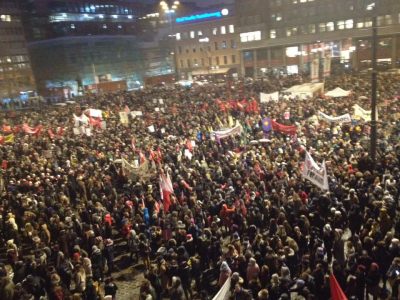Norway is widely viewed as a haven of gender equality, but local media took due note on Thursday, International Women’s Day, of all the inequality that remains. “The ‘good old boy’s club’ is still thriving,” claimed one 50-year-old lawyer who thinks she’s better off working in the public sector than the private.

New statistics from the labour organization Akademikerne, which represents a wide range of professionals in the private sector in Norway, had some sobering statistics to share on March 8, called Kvinnedagen in Norwegian, when thousands of women were gathering in Oslo at 6pm for a demonstration and march from Youngstorget downtown.
The numbers show that women’s share of the professional workplace in Norway has stood still for the past 10 years at just 30 percent. For the labour force in general, the numbers were 37 percent in 2016 and 63 percent for men.
That suggests many women still aren’t working outside the home, and that it’s still difficult to combine career and family even in a country with generous paid parental leave, subsidized day care, measures that allow parents to stay home with sick children and a culture that expects and encourages both men and women to be active in the workforce.
“It was impossible for me to work in the private sector and commit to unlimited hours on the job every day,” Marianne Børseth-Hansen, who now holds a leadership post in the legal division of the state police, told newspaper Dagsavisen. She instead chose to join the police force in a part-time post after finishing law school, and found more understanding for her family situation in the public sector than the private.
Kristin Skogen Lund, leader of the national employers’ organization NHO, admits that some old traditions and male-dominated culture linger at least in parts of the private sector. “But there’s a lot of work going on to change that,” Lund said. She pointed to the engineering company Sweco that’s consciously recruiting women. Newspaper Dagens Næringsliv (DN) reported Thursday on a company that requires male employees to take their share of paid parental leave.

In a country where some of the most powerful positions (like Lund’s) are held by women, not least in politics where the prime minister and her foreign- and finance minister are all women, it’s easy to assume the battle for equal rights has been won. Not so, with DN also reporting on Thursday that all the top executives of Norway’s huge sovereign wealth fund known as the Oil Fund are men, and the few women with “director” titles earn far less than the men.
‘Disappointing’ at the Oil Fund
Disparities at the Oil Fund emerged in research carried out by Core, Senter for likestillingsforskning that surprised many. “It just shows that the equality battle is very real when there are such large differences between women and men who work in leadership positions at the Oil Fund,” Rigmor Aasrud, finance policy spokesperson for the Labour Party. “It’s disappointing.”
Kari Elisabeth Kaski of the Socialist Left party (SV) was also surprised, and claimed the Oil Fund has a “special responsibility” to hire more women and, as a state-owned entity, pay them on equal terms as the men.” While the 35-year-old male director of Norges Bank Real Estate Management’s investments in the US earned NOK 2.6 million in 2017, for example, its 35-year-old female director of administration earned NOK 1.8 million.
The Oil Fund’s chief executive, Yngve Slyngstad, didn’t want to comment but its spokesperson Marthe Skaar explained that “pay is set according to the job and of course not gender. An important means of reducing the pay differences between men and women is to recruit more women into positions on the investment side. We want more women in investment-related positions. Unfortunately there are many more men who apply, but we see a positive development in the direction of more female applicants.”
Survey not encouraging
Accounting and consulting firm PwC recently conducted a global survey of 3,627 women in 61 countries, including 130 women in Norway, aged 28 to 40. Fully 40 percent said they feared having children would affect their careers, while nearly half of new mothers said they were overlooked for promotion because they had children. The survey comes just days after state statistics bureau SSB (Statistics Norway) reported another decline in Norway’s fertility rate, to its lower level ever.
Eli Moe Helgesen, a partner at a PwC in Oslo who has three children herself, claims she has not experienced such problems and that it should be fully possible to have both family and career. Fathers also have to take responsibility for the family: “Choose a wise and generous partner,” she advises.
After an autumn and winter full of revelations about sexual harassment on the job, even more demonstrators were expected at rallies and marches in Oslo and other Norwegian cities Thursday evening. Among them would be Jonas Gahr Støre, leader of the Labour Party that’s been at the center of harassment complaints involving one of its top politicians, Trond Giske. Støre noted in a commentary in Dagsavisen on Thursday that since politicians seek voters’ confidence, they must be held accountable when their behaviour attracts criticism.
“But ‘MeToo’ (the international campaign against sexual harassment) also extends to the entire society,” Støre wrote. “The extent (of harassment) is serious. Sexual harassment and abuse of power are social problems and a bad culture. We have to keep fighting against it, both through laws and regulations and, most importantly, attitudes.”
newsinenglish.no/Nina Berglund

